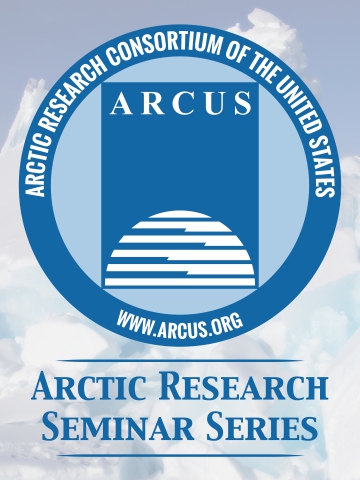Speaker: Emily S. Choy, McGill University, Climate Change Canada
The Arctic Research Consortium of the U.S. (ARCUS) invites registration for the next Arctic Research Seminar featuring Emily Choy, postdoctoral fellow in the Department of Natural Resource Sciences at McGill University and Environment and Climate Change Canada. Emily’s presentation, titled Marine Predators as Sentinels of Environmental Change in Arctic Ecosystems, will be held via Zoom.
Registration is required for this event. Instructions for accessing the webinar will be sent to registrants prior to the event.
Seminar Abstract
Arctic ecosystems are undergoing rapid change, and long-lived top predators are considered sentinels of the impacts of climate change on marine ecosystems. Beaufort Sea beluga whales (Delphinapterus leucas) and thick-billed murres (Uria lomvia) in northern Hudson Bay have experienced long-term shifts in prey species and declines in inferred growth rates, believed to be the result of environmental changes. In partnership with Inuvialuit communities, we examined inter-annual variation and environmental factors affecting prey, body condition, and physiology of Beaufort Sea beluga whales. The estimated proportional contributions of Arctic cod (Boreogadus saida) to beluga diet decreased from 2011 to 2014, coinciding with an increase in capelin (Mallotus villosus). Belugas consumed the highest proportions of capelin and the lowest proportions of cod in 2014. Body condition of whales was positively correlated with myoglobin, hemoglobin concentrations, and % hematocrit, resulting in lower total body oxygen stores in whales with lower body condition. The relationship between body condition and oxygen storage capacity may represent a positive feedback mechanism, in which environmental changes resulting in decreased body condition impair foraging ability. To examine the impacts of climate-induced prey shifts on the energetics of seabirds, heart rate was examined as a proxy for O2 consumption in murres and black-legged kittiwakes (Rissa tridactyla), and were calibrated with GPS-accelerometers to classify behaviours and activity rate. Finally, we examined the effects of Arctic warming on murre physiology. In response to increasing temperatures, murres exhibited limited heat tolerance and low ability to dissipate heat, with one of the lowest evaporative cooling efficiencies recorded in birds. These results highlight the various impacts of climate change on marine predators and their broader implications on Arctic ecosystems.

